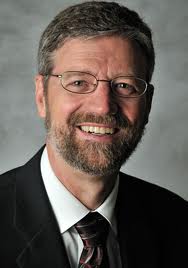By Ervin Stutzman
In response to my recent column on “Agreeing and Disagreeing in Love,” a pastor suggested that I write about the exercise of pastoral authority. He noted that the statement “Agreeing and Disagreeing in Love,” specifically asserts that “the guidelines should not be used as a substitute for the proper use of authority.” Yet, in his experience as a leader, the authority of the pastoral role seems to be eroding. As I regularly brush shoulders with pastors, I sense that his sentiments are widely shared by others. Thus, it deserves some reflection in this column.
Before I write about pastoral authority, however, I intend to address issues of power in the pastoral ministry. Power is the ability to influence or control other people, as well as the physical world around us. Authority is the delegated right to exercise such power.
Power is a sensitive subject to address in any polite company, especially in the church. When is the last time you had an open and congenial conversation with your congregation or leadership team regarding the use of your power as a pastor? Yet pastors often secretly long for more power. It may be hard for some of us to admit, but it’s true. Have you ever said to yourself “I wish I had less power in this congregation?” Not likely! Most of us wish to use our strengths more effectively and increase our influence in the congregation.
It’s hard to talk honestly about power with others. Can you imagine yourself saying to your congregation, “I wish I had more power in this church”? The longing for more power is likely to be viewed as a temptation to be resisted then as a healthy impulse to be cultivated.
A bumper sticker on the back of a car parked on my street declares that “When the Power of Love Overcomes the Love of Power the World Will Know Peace.” That gets at the heart of the issue for many of us in the church. Love and power seem to be at odds with each other, especially in pastoral ministry. We speak rather of “confronting” or “engaging” the powers. Perhaps we believe that the more powerful a pastor becomes, the less loving he or she will be.
It is sobering to contemplate the history of religious leaders who used social and political power to reinforce the truth as they understood it. It was the Pharisees and Sadducees, the most powerful religious leaders of Jesus’ day, who plotted to kill Jesus. They could not tolerate the threat which Jesus represented to their power over the people. More recently, nearly all of the Anabaptist martyrs in the sixteenth-century Reformation were killed by Christian leaders who were convinced they were acting In God’s service.
Philip Yancey once observed that “the peaks of success and earthly power … mark the peaks of intolerance and religious cruelty, the stains of church history we are most ashamed of today. It is as though love cannot coexist with power, and success contains within it the guarantee of a crash to come.” The history of the church testifies to the truth of Lord Acton’s assertion that “all power tends to corrupt, and absolute power corrupts absolutely.”
Yet our churchwide vision statement church points to a very positive view of power: “God calls us to be followers of Jesus Christ, and by the power of the Holy Spirit, to grow as communities of grace joy and peace, so that God’s healing and hope flow through us to the world.” It implies that without God’s power, our growth as a church and our ability to bring healing and hope to the world will be limited.
Jesus once told his disciples, “but you will receive power when the Holy Spirit comes on you, and you will be witnesses in Jerusalem, and in all Judea and Samaria, and to the ends of the earth.” Clearly, not all forms of power are contrary to the gospel. Indeed, the proper exercise of power is essential to the spread of the good news of Jesus Christ. Walking with Jesus does not negate the need for power in ministry. On the contrary, true discipleship empowers people to carry out God’s ministry in the world.
What does the exercise of that kind of power look like in pastoral ministry? What shall we do when we feel a sense of powerlessness in the face of difficult circumstances? How can we grow in our exercise of God’s power in the church? How can we empower others in our realm of influence? These are the kinds of questions that I intend to address in this column over the next several months.
P.S. I received a number of very interesting responses from pastors regarding their use of “Agreeing and Disagreeing in Love” in pastoral ministry. In due time, I intend to make their insights available to a broader audience. Meanwhile, keep your responses coming. One of the ways we increase the power of the whole church for ministry is to share the experience of our best practices with each other.


